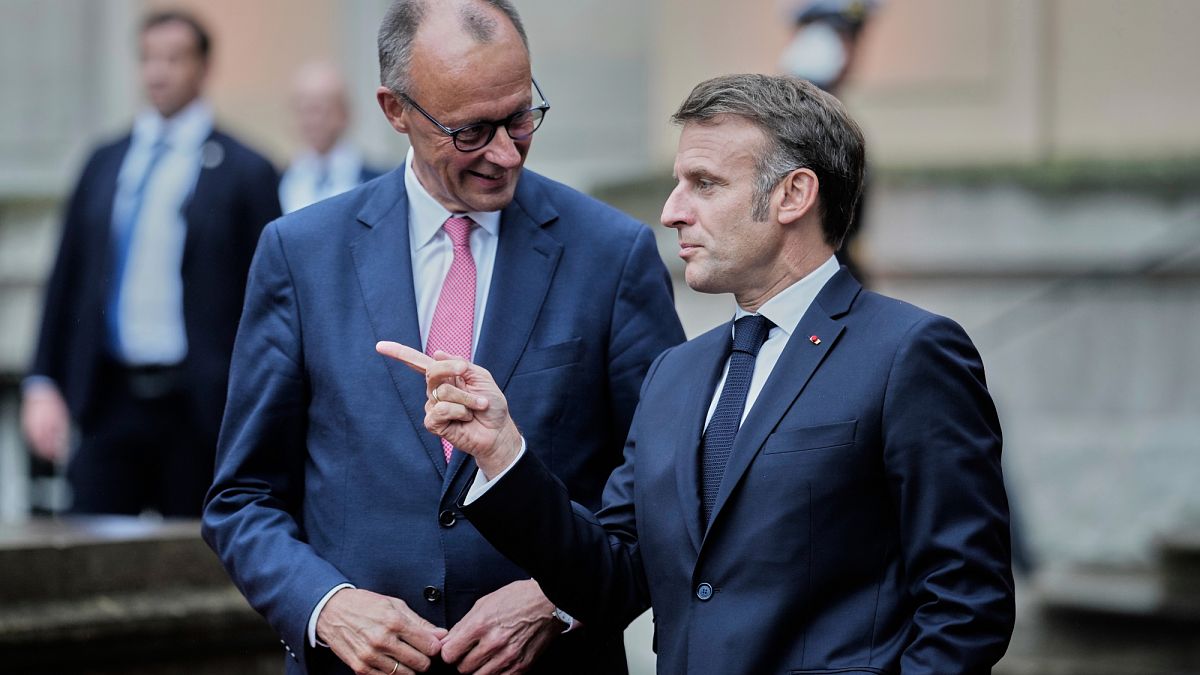Germany is becoming more French – and vice versa – when it comes to defence but big differences in the state of their public finances and strategic thinking mean the so-called Franco-German engine is unlikely to be able to power a big shift in the way the EU as a whole does defence.
“From a longer historical point of view, the degree of convergence (between the two countries) is arguably higher than it has been for, I would say, decades,” Jacob F. Kirkegaard, a senior fellow at the Brussels-based Bruegel think tank, told Euronews.
Both capitals see Russia as their biggest long-term threat, and both have pledged to pour hundreds of billions of euros into their military and defence industrial base. In Berlin, this has been dubbed a “Zeitenwende” (or historical turning point) while Paris said its latest military programmation law is “the ultimate strategic move”.
This convergence was driven by Russia’s ongoing full-scale invasion of Ukraine, which brought back conventional war to European soil, Donald Trump’s return to the White House, which has put in doubt continued long-term US commitment to Europe’s security, and a change of leadership in Germany.
The new chancellor, Friedrich Merz, “basically took what I can only describe as a Gaullist stance”, Kirkegaard said, by saying that “Europe needs to prepare for a future without a US security guarantee”.
‘France is converging with Germany’
Yet one example of how this rapprochement in defence remains a laborious process came last week when France’s Emmanuel Macron and Merz sought to diffuse tensions over a joint €100 billion project to develop a sixth-generation fighter jet.
At the core of the dispute is the demand by France to secure 80% of the workshare for the new Future Combat Air System (FCAS), negating previous agreements that it would be split equally between the two countries and Spain, which is also part of the project.
The French demand, however, “should not be as surprising as it seems”, Rafael Loss, a policy fellow at the European Council on Foreign Relations (ECFR), told Euronews, given that one of the major differences between France and Germany is how differently they view their military and the purpose they serve.
The armed forces in France are part of the national foreign policy – as recent deployments in the Sahel attest – with the country’s overseas territories and its possession of the nuclear weapon adding to its global perspective.
“That’s why the French military is much more comfortable with acting unilaterally or outside of EU, NATO contexts (than Germany’s), and this then extends to the kinds of capabilities that the French armed forces prefer acquiring,” Loss said.
“Everything that relates to the French nuclear deterrent has to work when France is alone. And that means that FCAS, which is supposed to replace the Rafale fighter bombers going forward in carrying French nuclear weapons, French military and political leadership will not accept a situation where they’re dependent to produce this capability because the nuclear deterrent depends on that capability.”
“French industry will need to be able to produce this aircraft by themselves if push comes to shove. They’re willing to cooperate when strategic orientations align, but ultimately they have to produce everything independently of others. And again, that’s something that many in Germany and across Europe haven’t quite realised,” he added.
Still, Loss continued, “France is converging with Germany” with the “realisation that for the sake of European security, it needs to show that it invests in its partnerships and relationships with Europeans, especially those on the eastern flank”.
‘A big wasted opportunity’
But the other major hurdle for the two to advance a common defence agenda at the EU level is the stark difference in their respective fiscal space.
Germany’s debt-to-Gross Domestic Product (GDP) ratio stood at 62.3% in the first quarter of the year. France’s was at 114.1%, well above what the bloc’s rules mandate (60%).
This structural divergence means that as European countries aim to significantly ramp up their defence spending and military capabilities to deter a possible Russian attack towards the turn of the decade, Germany can afford to invest heavily in defence, while France cannot.
For instance, Germany has asked to make use of a proposal by Brussels to loosen fiscal rules for defence spending, something France, which is targeted by an excessive deficit procedure, cannot do.
France, which has consistently invested in defence over the last few decades, has less ground to cover, so to speak, but the sums advanced by the German government (including a €500 billion fund to boost the military and the country’s infrastructure) should mean it catches up quickly.
But their public finances also “fundamentally place them on different sides of negotiating tables” at the EU level, Kirkegaard said.
The European Commission has put forward a plan to rearm Europe that it hopes will prompt member states to invest up to €800 billion before 2030. But most of that money is expected to come from member states’ coffers, which in the case of France, are quite depleted.
Given the scale of the task ahead, the Commission has been asked to come up with “innovative” financing options for defence. Macron has called for one of those options to be joint EU borrowing, something Germany has flat-out rejected.
For Kirkegaard, this means that the crisis ushered in by Russia’s war on Ukraine, is “a big wasted opportunity” for the bloc.
“This crisis, the war in Ukraine, will not lead to materially more EU institutional or fiscal integration. It will lead to an expansion of the EU with Ukraine and maybe other countries but that’s a different type of change to the EU and that’s also very different than the last many big crises we’ve had,” he said.
Read the full article here


